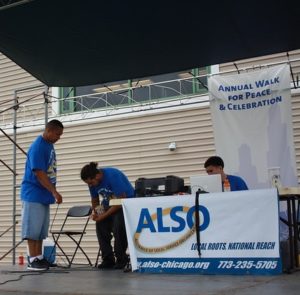ALSO Co-facilitates at SCY Quarterly Meeting
 ALSO staff and 10-10-10 Participants at the 21st Annual Walk for Peace
ALSO staff and 10-10-10 Participants at the 21st Annual Walk for Peace
On Thursday, August 11, 2016, I attended the quarterly meeting of Strengthening Chicago’s Youth (SCY) entitled “Community Development as Violence Prevention.” The meeting featured a panel discussion comprised of government and community organization representatives. Representatives shared examples of development initiatives that decreased violence in their own communities. Mary Ellen Messner (Department of Family and Support Services) discussed One Summer Chicago, Mayor Emanuel’s summer youth employment program. Jacqueline Samuel (Claretian Associates) presented on two programs that engage South Chicago community members in play, PlayStreets and Hoops in the Hood. Mike Tomas (Garfield Park Community Council) detailed his organization’s 4-year strategic approach to violence intervention centered on developing community and retail in its two main commercial corridors, which were “hotspots” for violence. Lastly, Sodiqa Williams (Safer Foundation) highlighted her organization’s work around creating employment opportunities, especially for those who have been involved with the criminal justice system. The panelists were then joined by Kurt Summers, City Treasurer, who fielded questions about the city’s Neighborhood Opportunity Fund and his intention to launch Fund 77, a capital campaign in which the city’s assets are invested in neighborhoods beyond downtown. Treasurer Summers spoke about growing up in Bronzeville and noting the economic disparities between his neighborhood and downtown.
For the second half of the meeting, participants gathered in small groups for break-out discussions on the following topics: 1) economic development, 2) housing, 3) employment for youth, 4) employment: individuals with criminal records, and 5) community cohesion. I was asked to co-facilitate a session and, given ALSO’s direct service work with people in-risk, I expressed interest in youth employment and employment for individuals with criminal records. Jessica Lopez from Up2Us Sports co-facilitated the session with me. Her organization uses sports as a positive outlet for youth development and provides funding for coaches in underserved communities. We were joined by representatives from Safer Foundation, John Marshall Law School, Health Education Leadership Program (HELP), and University of Chicago Medicine. One focus of our discussion was on the questionable success of the “Ban the Box” * legislation, which stipulates that potential employers cannot initially inquire about the criminal records or criminal histories of applicants. Our group voiced concern that the legislation, though well-intentioned, fails to prevent discrimination against “returning citizens,” which is preferred terminology for individuals who have been formerly incarcerated.
In an effort to increase opportunities for those with criminal records, my group brainstormed various solutions to prevent discrimination, including 1) educating employers on the rights of returning citizens and the retention benefits of hiring individuals from the community, 2) training incarcerated individuals and criminal justice employees on the opportunities available to returning citizens, and 3) combating the stigma against those with criminal records by bringing awareness to job discrimination and humanizing these individuals. The meeting’s themes and discussion were relevant to the work we do at ALSO through our 10-10-10 and street violence intervention programming. ALSO’s 10-10-10 program compensates youth from Humboldt Park $10/hr for 10 hours over 10 weeks. Many program participants are living in-risk, have criminal records, or are otherwise disconnected from school and mainstream employment opportunities. The 10-10-10 youth gain experience operating sound equipment for events, as well as job readiness training and peer skill building. We’ve also run multiple CeaseFire sites for several years and are awaiting additional financial support from the state. We currently employ those who are formerly involved in street organizations as violence interrupters and outreach workers through funding from the Chicago Community Trust. ALSO values the lived experiences of these workers and considers their expertise essential during the hiring process.
Thank you SCY, and all those who attended, for a great meeting.
Written by Deirdre O’Rourke
ALSO Program Coordinator

